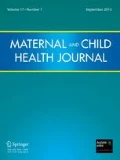Abstract
The purpose of this brief is to explore beliefs about health and body weight in young perinatal women. Thirty-two women were interviewed. Findings point to the importance of young women receiving education related to physical activity, nutrition, and the link between these components and a healthy weight during reproductive years.
References
Department of Health and Human Services. (2004). Preconception and interconception health status of women who recently gave birth to a live-born infant—pregnancy risk assessment monitoring system (PRAMS), United States, 26 reporting areas. Morbidity and Mortality Weekly Report 2007, 56 (SS-10).
Dietz, P. M., Callaghan, W. M., Morrow, et al. (2005). Population-based assessment of the risk of primary cesarean delivery due to excess prepregnancy weight among nulliparous women delivering term infants. Maternal and Child Health Journal, 9, 237–244.
Catalano, P. M. (2007). Management of obesity in pregnancy. Obstetrics and Gynecology, 109, 419–433.
Bradley, E. H., Curry, L. A., & Devers, K. J. (2007). Qualitative data analysis for health services research: developing taxonomy themes and theory. Health Services Research, 42, 1758–1772.
Hillemeier, M. M., Downs, D. S., Feinberg, M. E., et al. (2008). Improving women’s preconceptional health: findings from a randomized trial of the strong healthy women intervention in the central pennsylvania women’s health study. Women’s Health Issues, 18, S87–S96.
Clarke, P. E., & Gross, B. A. (2004). Women’s behavior, beliefs and information sources about physical exercise in pregnancy. Midwifery, 20, 133–141.
Abrams, B., Altman, S. L., & Pickets, K. E. (2000). Pregnancy weight gain: still controversial. American Journal of Clinical Nutrition, 71, S1233–S1241.
Huberty, J. L., Ransdell, L. B., Sidman, C., et al. (2008). Explaining long term exercise adherence in women who complete a structured exercise program. Research Quarterly for Exercise and Sport, 79, 374–384.
Gunderson, E. P., & Abrams, B. (2000). Epidemiology of gestational weight gain and body weight changes after pregnancy. Epidemiologic Reviews, 22, 261–274.
Siega-Riz, A. M., Evenson, K. R., & Dol, N. (2008). Pregnancy related weight gain—a link to obesity. Nutrition Reviews, 62, S105–S111.
Author information
Authors and Affiliations
Corresponding author
Rights and permissions
About this article
Cite this article
Huberty, J., Meendering, J., Balluff, M. et al. Healthy Weight in Young Perinatal Women: Exploring Beliefs. Matern Child Health J 14, 918–921 (2010). https://doi.org/10.1007/s10995-009-0537-3
Published:
Issue Date:
DOI: https://doi.org/10.1007/s10995-009-0537-3

